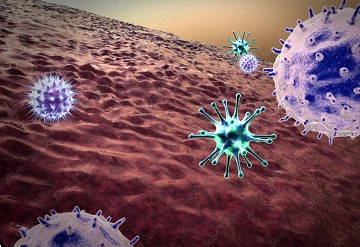COVID-19 News: Indian Scientists Discover Four Major Phenotypes Of Immune Dysregulation Caused By SARS-CoV-2 In COVID-19 Patients
Nikhil Prasad Fact checked by:Thailand Medical News Team Dec 26, 2023 1 year, 3 months, 1 week, 3 days, 20 hours, 31 minutes ago
COVID-19 News: The ongoing battle against the severe acute respiratory syndrome coronavirus 2 (SARS-CoV-2) continues to present challenges, with clinical heterogeneity and diverse prognoses observed among COVID-19 patients. A team of scientists from the National Institute of Biomedical Genomics in Kalyani, India, in collaboration with the Medical College and Hospital in Kolkata and the Regional Centre for Biotechnology in Delhi, has delved into the intricate world of immune responses to SARS-CoV-2. Their groundbreaking research covered in this
COVID-19 News report, has identified four major phenotypes of immune dysregulations, shedding light on the complex clinical manifestations witnessed in COVID-19 patients.
 Understanding the Clinical Heterogeneity
Understanding the Clinical Heterogeneity
As the COVID-19 pandemic has unfolded, clinicians and researchers have grappled with the varying clinical presentations of infected individuals. While hyper-inflammatory responses, such as the notorious cytokine storm, have been a focal point in discussions, the Indian research team recognized the need for a more nuanced exploration of altered immune responses. The study aimed to uncover the immunological signatures driving the progression of SARS-CoV-2 infection and to identify biomarkers that could differentiate between different trajectories of the disease.
Immunophenotyping: A Comprehensive Approach
To achieve their goals, the research team conducted an extensive immunophenotype analysis on blood samples obtained from 79 hospitalized patients with mild/moderate to severe COVID-19 infections. Samples from healthy controls and recovered donors were also included in the study. The researchers examined the interplay between innate and adaptive immune responses, seeking to understand how these interactions impact the severity and prognosis of the disease.
The Four Major Immune Dysregulations
The results of the study revealed multifaceted immune dysregulation, with variations across patients within the clinical spectrum. Four major immune dysregulations were identified:
-Depletion of M1φ (Impaired Antiviral Response): The study observed a rapid depletion of M1 macrophages (M1φ) at early stages of infection, emphasizing the crucial role these cells play in antiviral responses. The sustained low proportions of M1φ during the active phase of infection were associated with adverse disease prognosis.
-Immune Suppression/Exhaustion via T-Cell Activation: The activation of repressor molecules like CD4+/CD8+PD1, TIM3, and LAG3 indicated immune suppression and exhaustion. The study highlighted the significance of these markers in understanding the severity of COVID-19, even in the absence of a classic cytokine storm.
-Inappropriate Differentiation of Lymphocytes: Elevated proportions of CD4 naive, memory B and T cells, along with a reduction in inflammatory activators like TLR2/4/TIGIT, pointed to inappropriate differentiation of lymphocytes. This dysregulation further contributed to the unique pathomechanism signature observed in COVID-19 patients.
/>
-Cytokine Storm: While cytokine storms have been widely recognized as a common adverse outcome, the study revealed that a significant proportion of severe cases experienced poor prognosis without the classic cytokine storm. Instead, an imbalance between immune exhaustion markers and proinflammatory activators was identified as a critical factor influencing disease prognosis.
Study Design and Participants
The research included 79 SARS-CoV-2 infected hospitalized patients, categorized into mild/moderate and severe groups. Additionally, 48 healthy controls were enrolled. The study involved individuals with comorbidities, including Type 2 Diabetes Mellitus, heart disease, Tuberculosis, Hypertension, chronic obstructive pulmonary disease, Cancer, and others. The Charlson Comorbidity Index was calculated for all individuals.
Immunophenotyping of Cells
Immunophenotyping analysis focused on the distribution pattern of immune cellular subtypes of Lymphocytes and Monocytes. This comprehensive approach allowed the researchers to distinguish between cases and controls, as well as between recently recovered, long-term recovered seropositive individuals, and seronegative never-infected controls.
Discussion
The study's longitudinal analysis of hospital-treated COVID-19 patients unveiled altered responses of the hosts' immuno-cellular components, correlating with diverse outcomes. The distribution pattern of immune cellular subtypes emerged as a differentiator between cases and controls, providing insights into the immune dysregulation associated with SARS-CoV-2 infection.
Conclusion
In conclusion, the study's findings challenge the conventional understanding of adverse prognoses in COVID-19, expanding beyond the paradigm of cytokine storms. The identified immune dysregulations, including M1 depletion, activation of T cell-specific immune exhaustion markers, and inhibition of germinal center B cell responses, emphasize the need for individual-specific patient management. This research paves the way for tailored treatment strategies, steering away from uniform approaches and aiming at reducing the detrimental effects of immune imbalances caused by SARS-CoV-2 infection. As the world grapples with the ongoing pandemic, these insights contribute significantly to optimizing intervention strategies and enhancing future preparedness for similar viral diseases.
The study findings were published in the peer reviewed journal: Cytokine.
https://www.sciencedirect.com/science/article/abs/pii/S1043466623003125
For the latest
COVID-19 News, keep on logging to Thailand Medical News.
